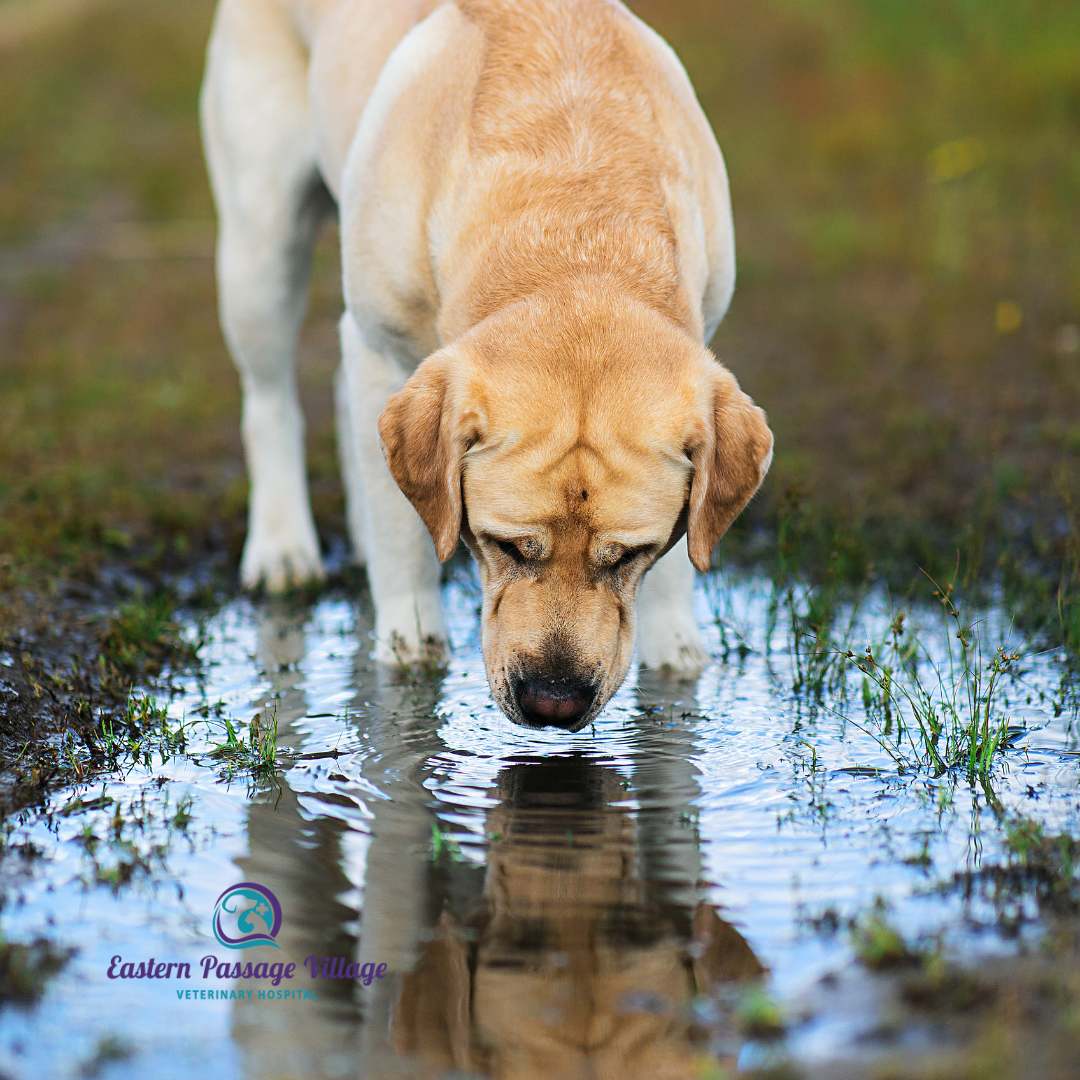By: Dr. Emma Bush
One of the five main vaccines that are used for our canine pets in the Maritimes Provinces is the Leptospirosis vaccine. But what is Leptospirosis, and why do we care so much about preventing it?

What is it?
Leptospirosis is a bacterial infection that can affect the liver, kidneys and even lungs. It is a serious infection that can make dogs gravely ill and can even be fatal in some cases. It is also zoonotic, which means that it can be spread to other species, including people! Because of this, it is an infection that we as pet owners want to do as much as possible to prevent.
The Leptospira bacteria live in warm still and slow moving water. It is spread by wildlife carriers, including raccoons and rats, through their urine. Infected urine gets into environmental water such as pond water, puddle water or ditch water and causes infection when irritated and/or broken skin comes into contact with that contaminated water. It can also be spread through bite wounds, drinking contaminated water, consuming infected tissues, and through other secretions.
The bacteria spread quickly in the bloodstream. Following an incubation period (generally 4-12 days), it can cause inflammation of blood vessels, leading to clinical signs such as fever, bleeding and bruising. With more time (generally after about 2 weeks) the bacteria set up shop in the kidneys where they create more inflammation. This is very painful and can ultimately lead to complete kidney failure through preventing the production of urine. Bacteria can also go to and cause inflammation in the liver. In some rare cases, it can also go to the lungs and eyes causing bleeding and inflammation there as well! Younger dogs (less than 1 year of age) tend to be the most seriously affected.
Though it is possible for cats to get infected, it is very rare and not associated with clinical disease. As such, it is something that we generally only worry about in our canine pets.
What can we do about it?
If your veterinarian is concerned that your dog may have leptospirosis, they will recommend testing of blood samples and/or urine samples. If infection is confirmed, treatment is instated through antibiotics to address the infection itself. However, hospitalization and intensive supportive care is also essential, including IV fluids to support blood flow through the damaged kidneys.
Prognosis is guarded; however, with appropriate treatment, fairly good survival rates have been reported. This all depends on the degree of organ damage existing, with severe cases requiring such intensive therapy as dialysis!
The infectious agent can be cleared from the blood in as soon as within 24 hours of starting antibiotics, however it takes about a week to be cleared from the urine so proper protective equipment must be used in order for handlers to protect themselves from becoming infected themselves. Because of this, personal protection is imperative. When handling infected or suspected infected animals, use proper personal protective equipment including boots, gloves and a gown to cover your clothes. Wash your hands thoroughly after handling the infected pet or anything the pet may have secretions on. If possible, once diagnosed, do not come into contact with urine, blood or tissues from an infected pet prior to receiving the appropriate treatment. If you have concern for leptospirosis, immediately contact your veterinarian.
Prevention
Vaccination is important to aid in prevention of this serious infection. The most common vaccine for leptospirosis has protection against 4 different serovars or types of leptospirosis. However, it is worth noting that though it will reduce the severity of the disease, it may not prevent infected dogs from becoming carriers. As such, part of prevention includes control of standing environmental water and access to such.
Stay tuned for part two of this month’s blog series on one of the other common infections that we vaccinate our canine patients for: Lyme disease.
References Used: Leptospirosis in dogs: https://veterinarypartner.vin.com/default.aspx?pid=19239&id=4951453
Leptospirosis and Your Pet: A CDC Fact Sheet: https://veterinarypartner.vin.com/default.aspx?pid=19239&id=4952105 Leptospirosis and Dogs (VCA): https://vcacanada.com/know-your-pet/leptospirosis-in-dogs
